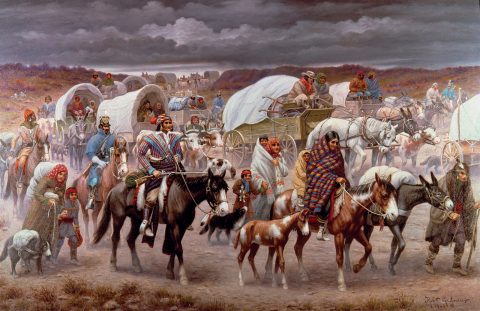
In the early 1800s, the United States government began a systematic effort to remove American Indian tribes from the southeast. On May 28, 1830, after many years of debate in Congress, President Andrew Jackson signed into law the Indian Removal Act, giving American settlers access to lands that were previously occupied by Native American tribes. Almost fifty thousand indigenous people were removed from the southeastern United States and relocated west of the Mississippi River. During the journey, known as the Trail of Tears, more than 4,000 Native Americans died from disease, hunger and cold.
In May, 1940, Nazi Germany invaded the Netherlands. Without any hope of changing the circumstances in their country, yet feeling compelled to help the voiceless and defenseless in whatever way they could, a Dutch Christian watchmaker named Corrie Ten Boom, along with her family, risked their lives to help many Jews escape the Nazis from the Holocaust. The Boom family was arrested in early 1944.
Ten Boom was initially held in solitary confinement. After three months, she was taken to her first hearing. At her trial, she spoke about her work with the mentally disabled; the Nazi lieutenant scoffed, because the Nazis had been killing mentally disabled individuals for years in accordance with their eugenics policies. Ten Boom defended her work by saying that in the eyes of God, a mentally disabled person might be more valuable than a watchmaker, or a lieutenant. Corrie and her sister Betsie were eventually sent to a political concentration camp and finally to a women’s labor camp in Germany. Betsie's health deteriorated, and she died. Fifteen days later, Corrie was released and returned home in the midst of the “hunger winter.” She still opened her doors to the mentally disabled who were in hiding for fear of execution.
Jesus said one of the two greatest commandments involved loving “your neighbor as yourself” (Matt. 22:39). According to James 2:15-17, loving our neighbors involves actively seeking their well-being according to best of our ability. The apostle wrote, “If a brother or sister is naked and destitute of daily food, and one of you says to them, ‘Depart in peace, be warmed and filled,’ but you do not give them the things which are needed for the body, what does it profit? Thus also faith by itself, if it does not have works, is dead.”
John wrote something similar, “By this we know love, because He laid down His life for us. And we also ought to lay down our lives for the brethren. But whoever has this world’s goods, and sees his brother in need, and shuts up his heart from him, how does the love of God abide in him?”
In a country like the United States, unlike the Roman Empire in the first century, Christians have the power to significantly affect the well-being of the the voiceless and defenseless through political influence and vote. If every Christian in the United States had rallied against the Indian Removal Act, they could have prevented President Andrew Jackson from signing it. Refusing to engage in politics in a country like the United States is failing to steward the resources God has placed within our sphere of influence to help our neighbors and promote righteousness.
Corrie Ten Boom and her family were not in a position to influence policy and laws in the Netherlands during Nazi occupation in the early 1940s, but they did what they could, with the limited resources at their disposal, to relieve the suffering of their “neighbor.”